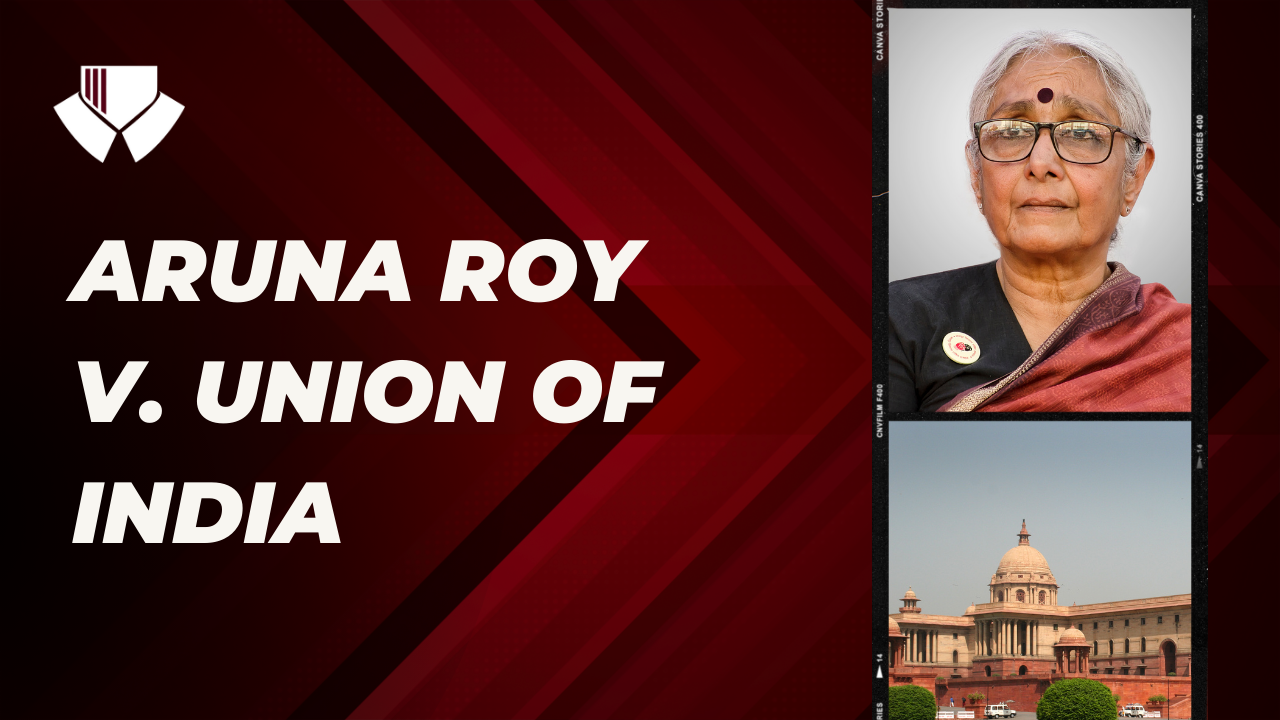This case Analysis is done by Nidhi, a 5th year law student of Institute of Law, Kurukshetra University, Kurukshetra.
Citation:AIR 2002 SC 3176,
Petitioner: Aruna Roy and Ors,
Respondent:Union of India and Ors.
Court: Supreme Court of India,
Bench:Justice M.B. Shah, Justice D.K. Dharmadhikari, Justice H.K.Seema,
FACTS OF THE CASE:
The case centered on a Public Interest Litigation (PIL) filed under Article 32 of the Indian Constitution against the National Council of Educational Research and Training (NCERT). The primary contention was that NCERT had published the National Curriculum Framework for School Education (NCFSE) without consulting the Central Advisory Board of Education (CABE). CABE had traditionally played a pivotal role in shaping national educational policies, having been in existence since 1935.
The NCFSE aimed to introduce religious education in schools, intending to provide students with knowledge about various religions and their significance, both within India and globally. However, the legal challenge argued that this framework violated constitutional provisions, including Articles 21, 27, and 28(1)
ISSUES:
- Whether the National Curriculum Framework for School Education, published by the National Council of Educational Research and Training, was required to be consulted with the Central Advisory Board of Education?
- Whether education about religion or religious education violated Article 28 of the Constitution of India and the principle of secularism?
CONTENTIONS:
Petitioner’s Arguments:
- The petitioner contended that the respondents had failed to seek approval from the Central Advisory Board of Education before implementing the National Curriculum Framework for School Education 2000. CABE, being the foremost authority in educational matters, had always played a vital role in the development of national educational policies. It possessed the necessary expertise and provided an effective mechanism for coordination between the State and the Center. Without CABE’s involvement, the implementation of NCFSE was argued to be untenable.
- Furthermore, the petitioner argued that the NCFSE and the syllabus framed therein violated the Constitutional principle of secularism, which is an integral part of the basic structure of the Indian Constitution. These educational materials were also deemed to infringe upon the fundamental right to education, the fundamental right to development, the fundamental right to information (read into the right to life under Article 21), and Articles 27 and 28 of the Constitution.
- Additionally, it was contended that the imposition of Sanskrit language, along with subjects like Vedic astrology, Vedic mathematics, and the designation of Hindu festivals as National Holidays, lacked justifiable grounds and were therefore unconstitutional.
Respondent’s Arguments:
- The respondent countered by asserting that CABE was not constituted under any Act or Rules, making it non-statutory. CABE consisted of 104 members, with 64 being ex-officio members, 32 nominated by the Government, and 8 elected by Parliament. The quorum for a Board meeting was set at 2/3rd of the total membership, as per the Resolution. The Resolution also mandated that the Board should meet at least once a year, with no gap of more than two years between consecutive meetings. The tenure of office for members other than ex-officio members was three years from the date of notification. However, the Preamble explicitly stated that CABE was constituted in April 1982, and its term expired in September 1985.
- Regarding the NCFSE, the NCERT explained that the curriculum was developed based on the recommendations of the SB Chavan Committee, which had presented its report to Parliament on June 22, 1999. The Chavan Committee’s recommendations focused on value-based education to promote social harmony by imparting knowledge about all religions and their interconnectedness. This report received unanimous approval in Parliament. The NCERT also consulted various institutions and individual experts and shared the draft curriculum with Education Ministers from all States and their respective governments, who would have been part of CABE had it been reconstituted. Furthermore, NCERT conducted 13 Regional and National Seminars across India, with the majority expressing support for the proposed curriculum. Hence, any claims of inadequate consultations were deemed unfounded.
- The respondent emphasized that religion played a crucial role in restraining innate human instincts and fostering a civilized cultural society. Religion provided the foundation for moral values necessary for the survival of human beings in a civilized society. The respondent argued that, since ancient times, saints had taught people how to coexist harmoniously with all living beings, including animals, plants, and the environment, encompassing air and water. Teaching these principles, according to the respondent, did not violate legal or constitutional rights or moral values.
- Furthermore, it was argued that knowledge of different religions would not lead to social unrest; rather, it was essential for fostering interfaith harmony. Ignorance, it was asserted, could breed hatred based on false assumptions, misguided preaching, and propaganda by ill-informed parties. Aligning with the fundamental duties outlined in Article 51A, the NCFSE was considered to be in accordance with these obligations.
JUDGEMENT:
Justice D.M. Dharmadhikari:
Justice Dharmadhikari opined that while the absence of consultation with CABE might not necessarily invalidate a national policy in a court of law, it was crucial to involve CABE in the development of significant national policies. He emphasized the need to maintain a careful distinction between religious instruction and religious education. The Indian Constitution, he noted, was committed to secularism, and differentiating between these two concepts implied an approach of understanding various religions comprehensively. This approach was essential to prevent the indoctrination of children into a specific faith, and it aimed to enable children to acknowledge the diversity of religions while understanding the concept of a singular ultimate reality.
Justice M.B. Shah:
Justice Shah held that non-consultation with CABE could not be a ground for setting aside the National Curriculum Framework for School Education (NCFSE). He pointed out that CABE was not a statutory body and that there was nothing in the government resolutions of 1986 and 1990 constituting CABE that mandated CABE’s consultation before framing the NCFSE. The primary function of CABE, he noted, was to advise the government and facilitate cooperation between the central and state authorities in implementing the national education policy.
Justice H.K. Sema:
Justice Sema highlighted that students could receive education about religion for general awareness, emphasizing that the core principles of all religions were similar, with only variations in practices. He stressed that education about religion should not promote dogmas and superstitions. The term ‘religious instructions’ mentioned in Article 28(1) was explained to have a specific interpretation, referring to the teaching of rituals and places of worship, which should not be allowed within educational institutions. However, this did not prohibit the study of religion from a philosophical and cultural perspective.
Regarding secularism, Justice Sema defined it as complete impartiality without bias towards any religion. However, he acknowledged that the state had encountered challenges in addressing misunderstandings and intolerance among its diverse religious communities. Consequently, promoting respect and understanding for various religions was seen as one of the commendable aspects of secularism.


